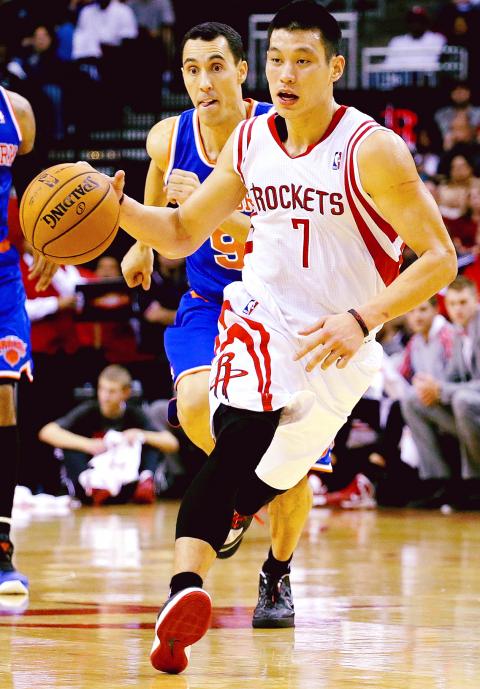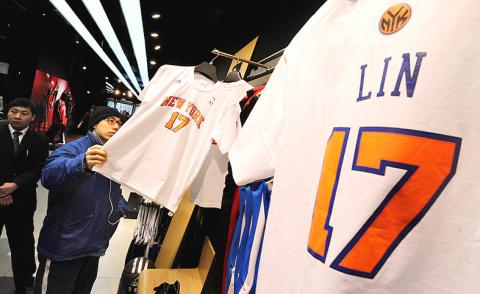For Jeremy Lin (林書豪), the Taiwanese-American basketball player whose meteoric rise in the NBA last year inspired fans around the world and proved that fortitude and resilience do pay off, God has a master plan — and playing basketball is part of it.
“It’s learning to fight to constantly live and play for God, and when I do, I’d be able to walk on water,” Lin explains in director Evan Jackson Leong’s documentary Linsanity, scheduled for release throughout Taiwan on Friday. The premiere was planned to coincide with the Oct. 13 pre-season NBA game at the Taipei Arena, between Lin’s Houston Rockets and the Indiana Pacers, said Christopher C. Chen, one of the producers.
Faith, family and hard work are all themes in the 88-minute biopic that draws on firsthand interviews with Lin, his family, friends and coaches, and features extensive footage of Lin’s early days as a point guard in youth leagues and in college basketball, tracing the Taiwanese American’s long and winding journey from a Palo Alto gymnasium to Madison Square Garden.

Photo: AFP
“Perseverance, and that story of belief that Jeremy has, is something everyone can relate to,” Leong explained during a telephone interview. “That’s what this story really captures.”
Leong, who entered the film industry after meeting and working with fellow UCLA film student Justin Lin, director of Better Luck Tomorrow and Fast and Furious, said he first approached Jeremy Lin about filming him in 2010, while Lin was still playing at Harvard. Lin, however, was initially reluctant to accept.
“We kept hanging around, and eventually we earned his trust,” Leong said.

Photo: AFP
That trust gave Leong access to Lin, his family and friends, years before the term Linsanity entered the lexicon of basketball fans around the world. On the whole, Linsanity documents how Lin’s unshakable religious faith and his belief in God’s plan guided him through the vicissitudes of his career, from when he first encountered racism on the court as a teenager, to when collegiate and professional coaches refused to play him.
Indeed, questions about race and ethnicity loom large in Linsanity, as the six-foot-three point guard increasingly realizes that coaches, players and fans might not be willing to accept a Taiwanese American in a sport dominated largely by African Americans.
“Yeah, I’ve always said if I was black, I would have gotten a D-one scholarship, but that’s my personal opinion,” Lin says in the film, explaining how he wound up at Harvard instead of on a Division I basketball team.
In one scene, Lin recounts the incessant taunting he endured while playing in the Ivy League for Harvard Crimson.
“You chink — can you even open your eyes? Can you even see the scoreboard?” Lin says he recalled hearing on the court.
Even after Lin finally made it to the NBA in 2010, signing a two-year deal with the Golden State Warriors, his hometown team, Lin was given limited playing time and was frequently sent down to the D-League, a minor league for professional players.
“For me, at the end of the day, it’s all about stereotypes,” Leong explained. “For Asian Americans, we’re a lot of lawyers and doctors. If you have an African-American computer engineer applying for Google, you’re going to think twice. [Lin] had to prove himself, too, like everyone else.”
And prove himself he would. After being cut from the Houston Rockets on Christmas Day 2011, Lin would once again rely on faith, family and hard work to guide him through a new chapter of his life with the New York Knicks. In one scene, right after the trade, Lin is seen shouldering a duffel bag and looking forlorn as he shuffles through a desolated TSA airport checkpoint to board a flight to the Big Apple, to join a team of players he has never met.
But change would come soon.
“I prayed that day, and my prayer is, ‘God, if this is your will to play [in the] NBA, you need to show us,’” Lin’s mother, Shirley, recalls in one scene, as she describes the day leading up to her son’s Feb. 4, 2012 breakout performance against the former New Jersey Nets. During that game, Lin, who was once again close to being cut, scored a career-high 25 points, giving the Knicks a 99-92 victory over the Nets.
What followed that February was dubbed Linsanity by the media, a phenomenon that no one, including Leong, can concretely define. But Linsanity did have every basketball fan — and certainly everyone in Taiwan — glued to television sets in homes, restaurants and bars to see what the first Taiwanese-American player in the history of the NBA would do next.
“It’s the first time for basketball that you’re seeing a character that looks like you,” explained Leong, who in his film presents the Linsanity hysteria with footage of Asian Americans and Taiwanese donning Lin jerseys, and cheering wildly whenever Lin makes a basket.
“Taiwanese people can look at Jeremy and see that he’s ours,” he said. “That’s really the biggest special part of this.”
Leong said they considered film titles other than Linsanity, but said Lin was not happy with them. Then, one day when Leong was looking at the word Linsanity in the paper, he realized that the letter “t” looked like a crucifix, and told Lin he thought this could send a powerful message about the film.
“One of the biggest things he wanted to share with everyone in this documentary was his faith,” Leong said.
Much about Lin’s life and career have been widely reported in Chinese- and English-language media and are already familiar to fans and non-fans alike, perhaps leading some moviegoers to question whether it is worth seeing a film whose story they already know.
But in Linsanity, Leong glues together all of the scattered pieces of Lin’s career and, through rousing highlights and dramatic music, reintroduces viewers to his improbable and uplifting story, rekindling the feeling so many fans felt last year when Lin proved to the world that Taiwanese-American men can also jump.
As for diversity in the NBA, Leong said he believes the league still has much to do to attract Asian-American players to professional basketball.
“Until there are 20 or 30 of those guys in the NBA, he’s still going to be the odd man out,” Leong said of Lin, who signed with the Rockets in 2012.
“But this is the moment, I think, that is going to inspire some Asian kid, whether in Taiwan, China or America, to say I can do that,” Leong added.

May 26 to June 1 When the Qing Dynasty first took control over many parts of Taiwan in 1684, it roughly continued the Kingdom of Tungning’s administrative borders (see below), setting up one prefecture and three counties. The actual area of control covered today’s Chiayi, Tainan and Kaohsiung. The administrative center was in Taiwan Prefecture, in today’s Tainan. But as Han settlement expanded and due to rebellions and other international incidents, the administrative units became more complex. By the time Taiwan became a province of the Qing in 1887, there were three prefectures, eleven counties, three subprefectures and one directly-administered prefecture, with

Taiwan Power Co (Taipower, 台電) and the New Taipei City Government in May last year agreed to allow the activation of a spent fuel storage facility for the Jinshan Nuclear Power Plant in Shihmen District (石門). The deal ended eleven years of legal wrangling. According to the Taipower announcement, the city government engaged in repeated delays, failing to approve water and soil conservation plans. Taipower said at the time that plans for another dry storage facility for the Guosheng Nuclear Power Plant in New Taipei City’s Wanli District (萬里) remained stuck in legal limbo. Later that year an agreement was reached

What does the Taiwan People’s Party (TPP) in the Huang Kuo-chang (黃國昌) era stand for? What sets it apart from their allies, the Chinese Nationalist Party (KMT)? With some shifts in tone and emphasis, the KMT’s stances have not changed significantly since the late 2000s and the era of former president Ma Ying-jeou (馬英九). The Democratic Progressive Party’s (DPP) current platform formed in the mid-2010s under the guidance of Tsai Ing-wen (蔡英文), and current President William Lai (賴清德) campaigned on continuity. Though their ideological stances may be a bit stale, they have the advantage of being broadly understood by the voters.

In a high-rise office building in Taipei’s government district, the primary agency for maintaining links to Thailand’s 108 Yunnan villages — which are home to a population of around 200,000 descendants of the Chinese Nationalist Party (KMT) armies stranded in Thailand following the Chinese Civil War — is the Overseas Community Affairs Council (OCAC). Established in China in 1926, the OCAC was born of a mandate to support Chinese education, culture and economic development in far flung Chinese diaspora communities, which, especially in southeast Asia, had underwritten the military insurgencies against the Qing Dynasty that led to the founding of